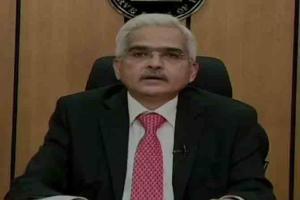Das said that COVID-19 is the worst health and economic crisis in the last 100 years with unprecedented negative consequences for output, jobs and well being

Shaktikanta Das. Picture courtesy/ ANI Twitter account
The Reserve Bank of India (RBI) has taken several measures to protect the country's financial system and support the economy after COVID-19 crisis, Governor Shaktikanta Das said on Saturday. "Both conventional and unconventional liquidity measures were taken to boost market confidence and ease liquidity stress. As a result, the Indian economy has started showing signs of going back to normalcy in response to the staggered easing of restrictions," he said while addressing the 7th SBI Banking and Economics Conclave here through video-conferencing.
ADVERTISEMENT
Das said that COVID-19 is the worst health and economic crisis in the last 100 years with unprecedented negative consequences for output, jobs and well being. It dented the existing world order, global value chains, labour and capital movements across the globe. "COVID-19 pandemic perhaps represents so far the biggest test of robustness and resilience of our economic and financial system," he said. Even before the onset of the virus, the central bank had taken several measures to reverse the slowdown in the economy. "The lagged impact of these measures was about to propel a cyclical turnaround in economic activity when COVID-19 brought with it calamities and miseries, endangering of lives and livelihood of people."
Das said the RBI is building buffers, raising capital crucial for ensuring credit flows and to build resilience in the financial system. Since February 2019, repo rate has been cut by 250 basis points. Repo rate is the rate at which the central bank lends money to commercial banks. Between 2015-16 and 2019-20, the government had infused a total of Rs 3.08 lakh crore in public sector banks (PSBs). As a result, the overhang of stressed assets in the banking system declined and capital position improved. But the pandemic will result in high non-performing assets (NPAs) and capital erosion for banks.
Das said the RBI has strengthened its off-site surveillance mechanism to identify emerging risks and assess the vulnerabilities across the supervised entities for timely action. "We are also working towards strengthening the supervisory market intelligence capabilities, with the help of both personal and technological intelligence."
However, while the multipronged approach has provided a cushion from the immediate impact of the pandemic on banks, the medium-term outlook is uncertain and depends on the COVID-19 curve.
Policy action for the medium-term will require a careful assessment of how the crisis unfolds, said Das.
Catch up on all the latest Mumbai news, crime news, current affairs, and a complete guide from food to things to do and events across Mumbai. Also download the new mid-day Android and iOS apps to get latest updates.
Mid-Day is now on Telegram. Click here to join our channel (@middayinfomedialtd) and stay updated with the latest news
This story has been sourced from a third party syndicated feed, agencies. Mid-day accepts no responsibility or liability for its dependability, trustworthiness, reliability and data of the text. Mid-day management/mid-day.com reserves the sole right to alter, delete or remove (without notice) the content in its absolute discretion for any reason whatsoever
 Subscribe today by clicking the link and stay updated with the latest news!" Click here!
Subscribe today by clicking the link and stay updated with the latest news!" Click here!






